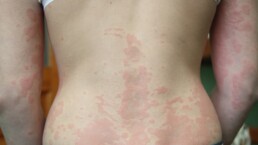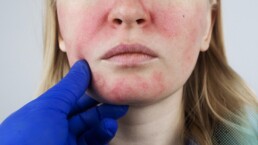Urticaria: Five Things to Know About Hives
Picture yourself going about your day when suddenly, your skin erupts into a raging itchy rash. This itch can leave you feeling uncomfortable and bewildered. This might get diagnosed as urticaria, more commonly known as hives. While it may not be as debilitating as fibromyalgia, which we've discussed in the previous article, urticaria can still significantly impact your quality of life. Today, we're delving into the itchy, bumpy realm of hives to arm you with knowledge and understanding.
In the next few minutes, we’ll answer five crucial frequently asked questions regarding urticaria that could change the way you view this common yet often misunderstood condition. From its sneaky symptoms to potential dietary triggers, we'll explore the ins and outs of hives, in five minutes or less. But before we dive in, it’s important to note that this is a common condition and there are things that can be done to lessen or eliminate its effects in your life. Did you know that, according to the British Association of Dermatologists, urticaria affects up to 20% of people at some point in their lives? That's right, you're not alone in this itchy battle.
So, without further ado, let's scratch beneath the surface and uncover the five things you need to know about urticaria, aka hives.
1. What exactly is urticaria, and why does it happen?
Like an unwelcome guest, it shows up unexpectedly and causes much discomfort and, sometimes, a feeling of embarrassment. But what's really going on beneath the surface?
At its core, urticaria is an immune reaction, that may be part of a wider allergic response. Your immune system, usually your stalwart defender, suddenly goes into overdrive. It releases a substance called histamine, which causes small blood vessels to leak. The result? Those telltale red, itchy welts we call hives.
But here's where it gets interesting or concerning. Urticaria can be triggered by a veritable smorgasbord of factors:
- Foods (think shellfish, nuts, or eggs). We’ll touch on this some more later in the article.
- Medications
- Insect bites or stings
- Physical stimuli (like pressure or cold)
- Stress (yes, your mind can make you itchy)
- Infections
However, in many cases, the exact cause remains a mystery, making it somewhat tricky to diagnose in some cases.
2. What are the symptoms of hives?
Now, you might be thinking, "Surely, I'd know if I had hives?" Well, not always. Urticaria can be a deceptive, presenting in various ways that might catch you off guard.
The classic symptoms include:
- Welts: Raised, often red bumps on the skin
- Itching: Can range from mild to severe
- Swelling: Particularly in the lips, eyelids, or throat.
But here's where it gets tricky. These symptoms can appear and disappear faster than it can take you to get seen by your doctor making it sometimes more difficult to diagnose. One moment you're itching like mad, the next, your skin looks perfectly normal. This on-again-off-again nature is one of urticaria's hallmarks. Physically being examined by a healthcare provider is crucial for the journey to recovery.
3. Are there different types of urticaria I should be aware of?
Yes. There are different types of urticaria that are commonly experienced. What are they and what differentiates them?
- Acute Urticaria:
- Lasts less than six weeks
- Often triggered by specific allergens or infections
- Usually resolves on its own
- Chronic Urticaria:
- Persists for more than six weeks
- Can last months or even years
- Often has no identifiable cause
- Physical Urticarias:
- Triggered by physical stimuli e.g., dermographism (hives appear when skin is stroked), cold urticaria (triggered by cold temperatures), cholinergic urticaria (brought on by heat or exercise)
Understanding these distinctions is crucial, as they can influence treatment approaches and management strategies.
4. How can I stop urticaria from impacting my daily life?
Living with urticaria can be like trying to navigate a maze blindfolded. The impact on daily life can be unexpected and profound, affecting everything from your wardrobe choices to your social calendar.
Imagine this scenario: You've got an important presentation at work, but you wake up covered in hives. Or perhaps you're planning a romantic evening, only to find your face swollen and itchy. Urticaria doesn't just affect your skin; it can take a toll on your confidence and mental wellbeing too.
But fear not. There are steps you can take to manage its impact:
- Identify and avoid triggers: Keep a diary to track potential causes.
- Dress smart: Opt for loose, cool clothing to minimise irritation.
- Cool it down: Apply cool compresses to soothe itchy areas.
- Stay moisturised: Use fragrance-free, hypoallergenic moisturisers to keep skin hydrated.
- Manage stress: Practice relaxation techniques like meditation or yoga.
Remember, while these self-help measures can provide relief, it's crucial to consult a healthcare professional for proper diagnosis and treatment. They might prescribe antihistamines or other medications to help control symptoms.
5. Can my diet really influence urticaria symptoms?
The relationship between diet and urticaria is like a complex dance - intricate, sometimes unpredictable, but undeniably important.
While food allergies can certainly trigger acute urticaria, the link between diet and chronic urticaria is less straightforward. However, research suggests that what you put on your plate could indeed influence your symptoms.
Certain foods contain naturally occurring histamines or cause the body to release histamine. Foods high in histamine include:
- Fermented foods (think aged cheeses, wine, sauerkraut)
- Cured meats
- Certain fish (particularly if not fresh)
- Spinach and tomatoes
- Chocolate and citrus fruits
But before you clear out your fridge, keep in mind that not everyone with urticaria reacts to these foods.
Some sufferers find relief by following a low-histamine diet, while others get relief from anti-inflammatory foods like omega-3 rich fish, leafy greens, and berries. The key is to work with a healthcare professional or registered dietitian to identify your personal triggers and develop a balanced eating plan that works for you.
Time To Act
Knowledge, as they say, is power. Armed with the information in this blog article, you're better equipped to face the challenge of urticaria head-on. Remember, while hives can be frustrating and uncomfortable, they're not insurmountable.
If you're grappling with persistent or severe urticaria, it's time to take action. Don't let hives control your life. A healthcare professional can provide personalised advice and treatment options tailored to your specific situation.
At CAS Medical, we are here to help you navigate the choppy waters of urticaria. Whether you need help identifying triggers, managing symptoms, or exploring treatment options, we're just a phone call away.
Don't let another day go by feeling uncomfortable in your own skin. Contact CAS Medical today and take the first step towards clearer, calmer skin and a life less itchy.
Rosacea: Causes, Symptoms, and Management
Rosacea is a chronic skin condition that affects millions of people in the UK, particularly those with fair skin. This article will provide a comprehensive overview of rosacea, including its causes, symptoms, and management strategies. We'll explore various treatment options and preventative approaches to help you better understand and control this often-misunderstood condition.
In this article, you'll learn:
- What rosacea is and who it typically affects
- The main symptoms and triggers of rosacea
- Effective treatment options and preventative measures
- How to manage rosacea in your daily life
Understanding Rosacea: Causes and Symptoms
What is Rosacea?
Rosacea is a chronic inflammatory skin condition that primarily affects the face. It's characterised by redness, visible blood vessels, and sometimes small, pus-filled bumps. While it can affect anyone, rosacea is most common in fair-skinned individuals of Northern European descent.
According to the National Rosacea Society, an estimated 415 million people worldwide are affected by rosacea. In the UK, it's believed that up to 1 in 10 people may have some form of rosacea, though many cases go undiagnosed.
Symptoms of Rosacea
The primary symptoms of rosacea include:
- Facial redness (erythema): Persistent redness in the central part of the face.
- Visible blood vessels (telangiectasia): Small blood vessels on the nose and cheeks become visible.
- Swollen red bumps: Some people develop small, red, pus-filled bumps that may resemble acne.
- Eye problems: In some cases, rosacea can affect the eyes, causing dryness, irritation, and swollen eyelids.
- Enlarged nose: In severe cases, the skin on the nose may thicken, leading to a condition called rhinophyma.
Causes and Triggers
While the exact cause of rosacea remains unknown, researchers believe it involves a combination of genetic and environmental factors. Some common triggers include:
- Exposure to sunlight
- Extreme temperatures (hot or cold)
- Spicy foods and hot drinks
- Alcohol consumption
- Stress and anxiety
- Certain skincare products
- Exercise
- Some medications
It's important to note that triggers can vary from person to person. Keeping a diary of flare-ups can help identify your specific triggers.
Managing Rosacea: Treatment Options and Preventative Approaches
Treatment Options
While there's no cure for rosacea, various treatments can help manage symptoms and reduce flare-ups. Treatment options include:
- Topical medications: Creams or gels containing ingredients like metronidazole, azelaic acid, or ivermectin can help reduce redness and inflammation.
- Oral antibiotics: For more severe cases, oral antibiotics like doxycycline may be prescribed to control inflammation.
- Laser and light therapies: These treatments can help reduce visible blood vessels and overall redness.
- Skincare routines: Gentle, non-irritating skincare products can help soothe and protect rosacea-prone skin.
- Lifestyle changes: Identifying and avoiding triggers can significantly reduce flare-ups.
Preventative Approaches
While it's not always possible to prevent rosacea, there are steps you can take to minimise flare-ups and protect your skin:
- Sun protection: Use a broad-spectrum sunscreen with at least SPF 30 daily, even on cloudy days.
- Gentle skincare: Choose fragrance-free, non-comedogenic products designed for sensitive skin.
- Avoid known triggers: Once you've identified your triggers, take steps to avoid or minimise exposure to them.
- Stress management: Practice stress-reduction techniques like meditation or yoga to help prevent stress-induced flare-ups.
- Diet modifications: Consider reducing your intake of spicy foods, hot drinks, and alcohol if these trigger your symptoms.
- Temperature regulation: Protect your face from extreme temperatures, both hot and cold.
Management and Control
Living with rosacea can be challenging, but with the right knowledge and management strategies, it's possible to control symptoms and improve your quality of life. Remember that rosacea is a chronic condition, and consistent care is key to managing it effectively.
Key takeaways:
- Rosacea is a common skin condition affecting millions in the UK
- Symptoms include facial redness, visible blood vessels, and sometimes bumps or eye problems
- While there's no cure, various treatment options can help manage symptoms
- Identifying and avoiding triggers is crucial for preventing flare-ups
- Consistent skincare and lifestyle modifications can significantly improve rosacea management
If you suspect you have rosacea or are struggling to manage your symptoms, don't hesitate to contact us. We can help identify the condition and get you the help you need.

